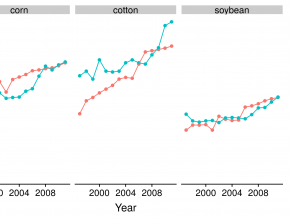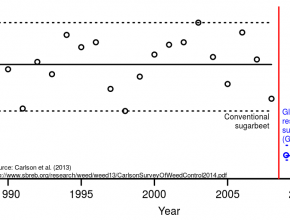
Have genetically engineered herbicide-resistant crops increased or decreased herbicide use?
It’s a simple question. And at first glance it seems like there should be a simple answer to this simple question. We have planted millions of acres of genetically-engineered (GE) crops, a vast majority of which are resistant to herbicides. In the U.S., we’ve collected lots of herbicide sales and usage data, spanning the entire time period when GE herbicide-resistant crops went from non-existent to dominating the landscape. So we should be able to simply look at the herbicide data before …
Have genetically engineered herbicide-resistant crops increased or decreased herbicide use? Read More
